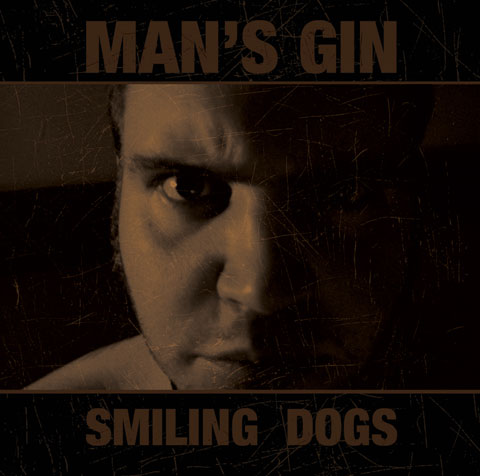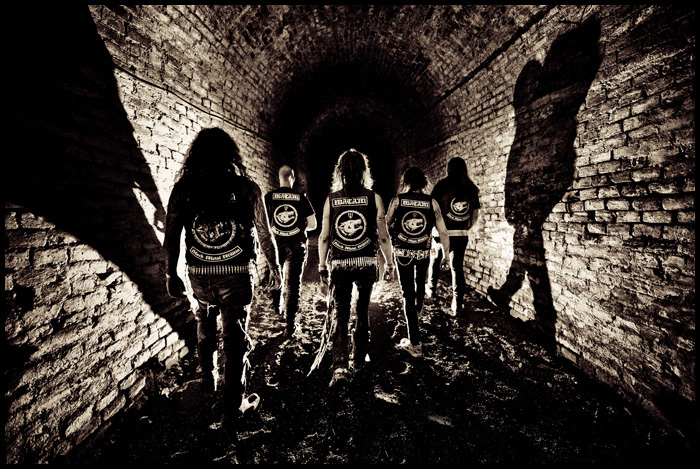
(Profound Lore)
If you were to look in my iPod’s history, you would see that I have devoted a wildly disproportionate number of plays to songs from Gin, the 2009 album from American black metal band Cobalt. (To be completely accurate, they call themselves a “war metal” band, which may be a more appropriate designation, but it’s also a sub-sub-subgenre with which almost no one is familiar, so for now I’m calling it “black metal” and leaving it at that.) In fact, in numerous places, I named Gin the third best album of last year, and I often think today that it might be even better than that. It is one of the bleakest and most intense records I have ever heard, but it is also diverse and unpredictable and layered, which is rare in any genre, but especially so in black metal, where slavish adherence to form is too often held aloft as some form of musical ideal (or, in the parlance of the genre, “trooth”).
Cobalt is a two-piece, originally from Colorado, made up of vocalist/lyricist Phillip McSorley and multi-instrumentalist Erik Wunder. Last year, at the height of interest in Gin, McSorley was frequently projected (by the media, at least) as the face of Cobalt, due in no small part to the fact that he is a sergeant in the U.S. Army who served in Iraq (hence, I guess, the “war metal” tag) and is currently stationed in Manhattan, Kansas. That angle left Wunder (now relocated to Brooklyn) as something of a second banana—a take not supported by the band’s instrumental work, which is, in fact, the product of one of the genre’s true visionaries.
Man’s Gin is Wunder’s first project as a frontman, and Smiling Dogs is Man’s Gin’s debut LP and, on first blush, it would seem to share a lot of similarities with Cobalt, even beyond the presence of Wunder: Both have found a home at Profound Lore, the genre-changing Canadian label responsible for releasing a great deal of black metal’s most exciting and expansive new music; both feature deep-sepia cover art in hues of black and copper; and both have claimed the word “gin” as part of their identity.
But that’s more or less where the similarities end. As I wrote in a July review of Smiling Dogs’ title track: Tonally, there is one comparable cut on Gin—the album’s suffocating and grim “Dry Body,” one of its few non-metal moments. Smiling Dogs is not a black metal record, nor a war metal record, nor even a metal record: It sounds a lot like Alice in Chains circa Jar of Flies, or Dax Riggs, or Nick Cave, or Mark Lanegan’s solo material. (Upon hearing it in the office, a co-worker asked if I was listening to Pearl Jam.) Naturally, it is because of Cobalt that I was interested in Man’s Gin, but an affinity for one will hardly signify an affinity for the other.
Still, both bands deal exclusively in dark, masculine themes—death, betrayal, vengeance, violence, anger—and in my very limited anecdotal experience, fans of Cobalt have embraced Man’s Gin. To wit: I attended a concert earlier this summer, a month or so prior to the release of Smiling Dogs, at which Man’s Gin was the opening end of a lineup featuring some of the most flesh-searing black metal bands on the planet; and on the whole, the crowd seemed to love them.
As he showed that night, at that concert, Wunder is a strong frontman and he has a powerful, expressive baritone—a great voice (especially if you think Layne Stayley had a great voice, which I do). More impressive still is his sense of songcraft, which is on generous display throughout Smiling Dogs. This is minimalist, pitch-black music—with roots in Appalachian and Irish folk, blues, German beer-hall songs, murder ballads—but Wunder is a gifted tunesmith who writes immediately indelible melodies that demand singing along. (It also goes well with alcohol, which may or may not be made clear by everything else I’ve written here.) The music’s catchiness is evident throughout, but if you’re looking for some immediate fixes, check the chorus on “Smiling Dogs,” the climactic guitar solo on “The Death of Jimmy Sturgis,” and the entirety of “Nuclear Ambition, Pts. 1 and 2,” the album’s highlight and centerpiece, the latter half of which makes reference to “Richard Nixon’s stronghold” and uses its sharp hooks to sink lines like “I need to know where I can buy a drink…It’s time to fist-fuck everything.” (Perhaps not surprisingly, Wunder lists Hunter S. Thompson as a major influence.)
I find myself trying to imagine what Wunder might accomplish by bridging the gap somewhat between Cobalt and Man’s Gin—his voice and melodic choices applied to more aggressive music, especially with his estimable guitar skills, might result in something that transcends all boundaries. But if this is all we get from him—Cobalt and Man’s Gin, I mean—well, this is more than enough. This is more than most musicians are capable of. This is pretty great already.
(This is video from the aforementioned show I attended at The Studio at Webster Hall, wherein Man’s Gin opened for Castevet, Velnias and Altar of Plagues. This video is by unARTigNYC. For more of his work go to http://unartignyc.com/recordings/.)







